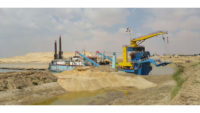In October, the SCA awarded a consortium, comprising Royal Boskalis Westminster NV and Van Oord of the Netherlands, National Marine Dredging Co. of Abu Dhabi and Jan de Nul of Belgium, a contract worth $1.5 billion to dredge part of the new channel as well as widen and deepen—to a depth of 24 meters—parts of the existing canal. Most of this dredging work will be carried out by 17 cutter-suction dredgers. Work is to begin this year and conclude in 2015. Each partner in the consortium will earn $375 million from the contract.
Another dredging contract, worth $540 million, was awarded to Great Lakes Dredge and Dock Corp. and Dredging International, part of the Dredging Environmental and Marine Engineering Group. The contract, split 25%-75%, respectively, between the two firms, covers Lot 6 work, the scope of which is to widen and deepen to 24 meters the western branch of the canal at the Great Bitter Lake, Deversoir Reach and Kabret Reach, which covers a 25-km stretch of the canal.
Overall, some 36 dredgers will be involved in digging the new channel and widening and deepening the existing one.
New road and rail tunnels beneath the canal are planned, too. In April of this year, the Spanish company Getinsa Paymacotas was contracted by the government to carry out technical studies and prepare tender documents for two road tunnels and one rail tunnel for Egypt’s National Authority for Tunnels. Today, only one road tunnel exists beneath the canal. The tunnels are designed to contribute to the creation of a new industrial zone in the northern Sinai Peninsula and connect the region with other parts of Egypt.
To finance the project, the Egyptian government in September issued share certificates in a new joint stock company through four Egyptian banks and raised $8.785 billion in a matter of days. Five hundred million shares were offered exclusively to Egyptians, and the Central Bank of Egypt reported that 82% of the shares were sold to individuals. The share issue attracted $3.7 billion in fresh capital to Egyptian banks, the Central Bank said.
Security Concerns
Since the January 2011 revolution in Egypt as well as recent developments in other parts of the Middle East, security is becoming an increasing concern for the Egyptian authorities. For several years, a militant Islamist group has been active in the Sinai Peninsula, concentrating its attention on Egypt’s export gas-pipeline infrastructure at Al-Arish and, occasionally, on the tourist resorts near Nuweiba and Sharm al-Shaikh, along the Red Sea coast. However, over the past year, more attacks have been launched against the army and police.
In mid-November, the group claimed responsibility for an attack against an army guard post that resulted in the deaths of more than 30 people. The group, previously known as Ansar Bayt al-Makdas, announced in November that it had sworn allegiance to the Islamic state—that is, ISIS or ISIL—and launched an attack on the gas pipeline, the so-called Arab Gas Pipeline, that transports Egypt's gas to Jordan.
According to reports in the Israeli media, the group said it would not allow Egypt's gas exports to Jordan without the consent of the self-proclaimed caliph of the Islamic state, Abu Bakr al-Baghdadi. The attack was in response to Jordan’s support for the U.S.-led coalition that is fighting the Islamic state in Iraq and Syria.
At least one attack on a ship transiting the Suez Canal was reported earlier this year, but none have been reported since. As work progresses and the area attracts more international investment, expanded security for the expanded Suez Canal likely will be a top priority for the Egyptian authorities.


Post a comment to this article
Report Abusive Comment